Overview
The primary advantages of automated unitization title systems in real estate encompass:
- Enhanced efficiency
- Greater accuracy in verifying property ownership
- Diminished operational costs
This article substantiates these claims by illustrating how automation technologies, such as Parse AI, optimize title research processes, reduce manual errors by as much as 40%, and empower firms to handle increased transaction volumes. Consequently, these improvements culminate in substantial time and cost savings, underscoring the critical role of automation in modern real estate practices.
Introduction
Automated unitization title systems are revolutionizing the real estate industry, delivering unmatched efficiency and accuracy in property ownership verification. By leveraging advanced technologies such as machine learning and optical character recognition, these systems enable professionals to optimize their title research processes, significantly minimizing manual effort and operational costs.
However, as the adoption of automation accelerates, critical questions emerge: how can real estate firms seamlessly integrate these technologies while safeguarding compliance and data security?
The examination of these benefits and challenges uncovers a transformative opportunity for the industry, paving the way for a comprehensive understanding of the advantages that automation offers to title research.
Parse AI: Streamline Title Research Processes with Automation
Parse AI employs advanced algorithms and to automate the extraction of essential data from . This innovative approach significantly typically required in research, enabling professionals to concentrate on more complex tasks. By optimizing the , Parse AI not only but also improves accuracy, establishing itself as an indispensable tool for real estate professionals who rely on automated unitization title systems for swift and reliable .
Success stories within the industry illustrate that organizations leveraging OCR technology have markedly increased their , with many reporting processing time reductions of up to 50%. As the real estate landscape evolves, the integration of machine learning and OCR emerges as a , allowing researchers to navigate complex ownership documents with unmatched speed and precision.
According to McKinsey, sectors more exposed to AI are witnessing 4.8 times greater labor productivity growth compared to average growth rates, underscoring the broader trend of AI adoption in the industry. Furthermore, with 95% of employees acknowledging the value of generative AI, the potential for enhanced efficiency in research is clear. Nevertheless, it is essential to remain vigilant regarding privacy and governance risks associated with AI, as 81% of US executives express concerns in this domain.
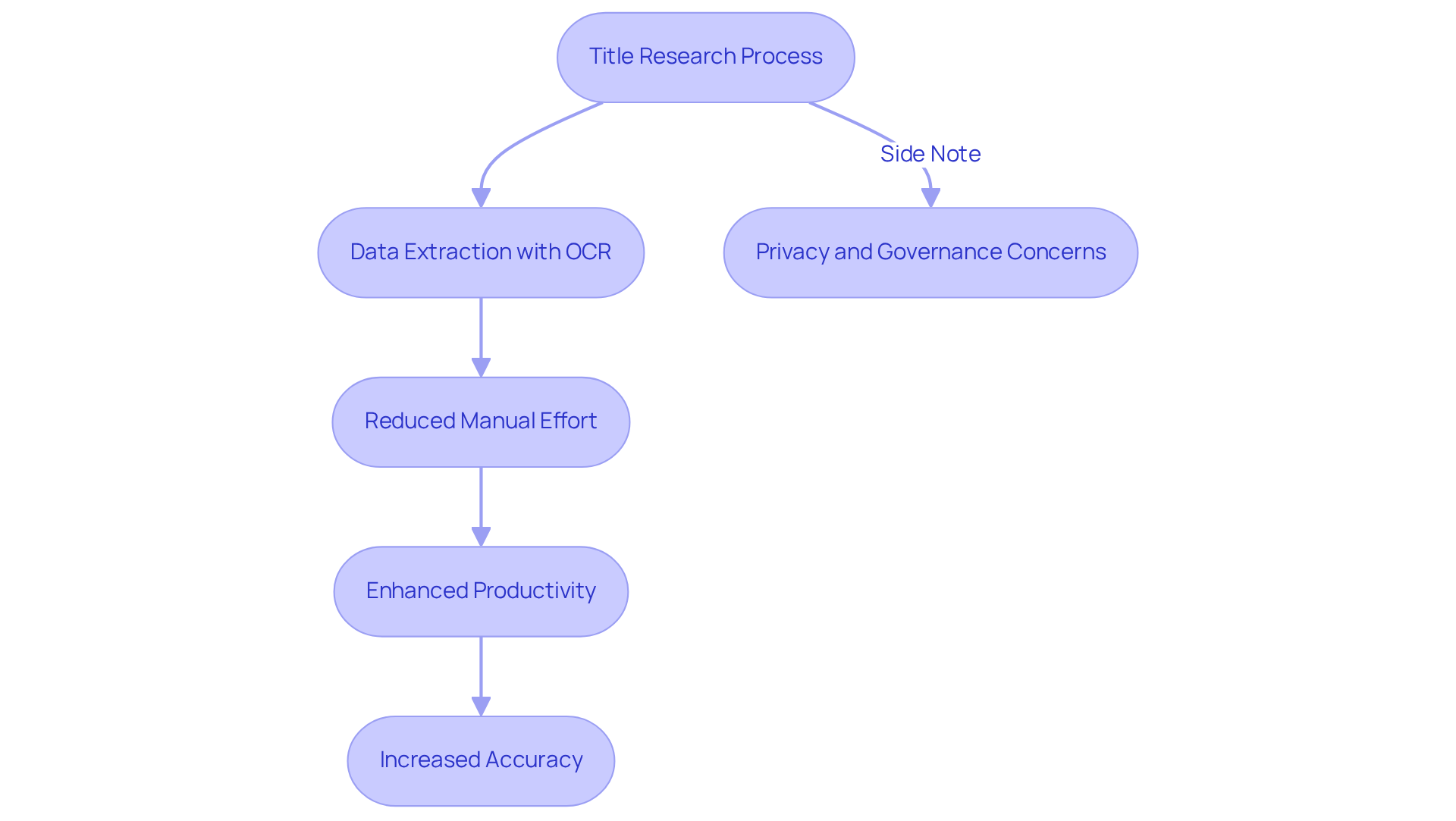
Enhance Accuracy in Property Ownership Verification
significantly enhance the precision of by considerably minimizing human errors often associated with manual input. Utilizing , such as Parse AI, these systems cross-check diverse information sources and swiftly identify discrepancies, thus providing researchers with the most reliable information available. This elevated accuracy is essential for mitigating potential with property laws.
As noted by the Resolve Team, decrease manual entry mistakes by 40%, directly reducing operational expenses. Real estate experts emphasize that by , [automated unitization title systems](https://axistechnical.com/data-quality-matters-how-tech-can-enhance-title-industry-accuracy) not only enhance but also foster greater confidence in the research process. Firms employing automated unitization title systems report a reduction in entry mistakes by as much as 40%, leading to more precise title searches and improved customer satisfaction.
Furthermore, the repercussions of inaccurate data can be severe, resulting in legal and financial liabilities, diminished operational efficiency, and a damaged reputation. As the industry progresses, embracing automated unitization title systems is crucial for maintaining a competitive edge and providing superior service.
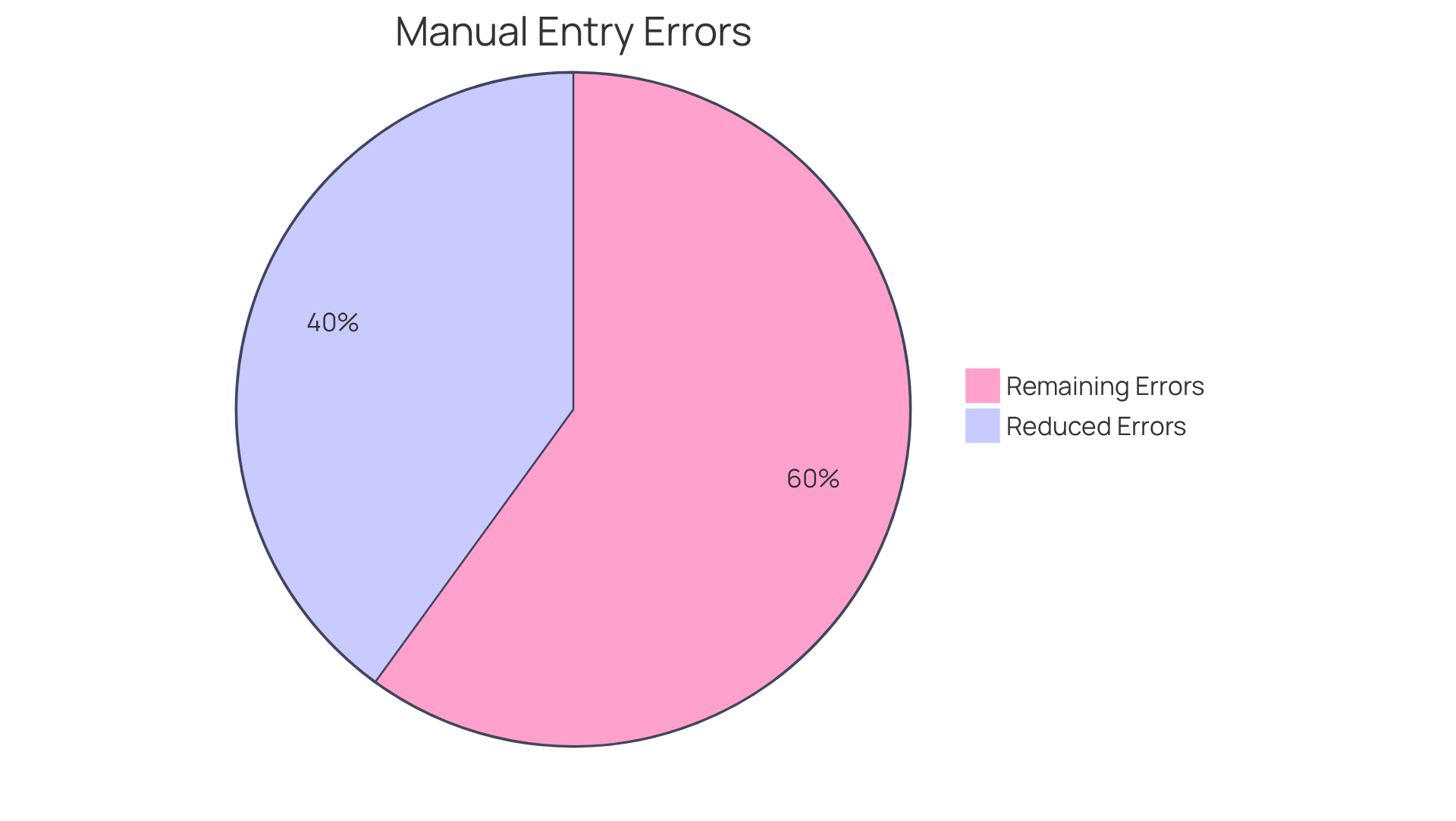
Reduce Time Spent on Title Research and Documentation
significantly reduce the time required for research and documentation. By leveraging advanced , empowers title researchers to complete their tasks in a fraction of the time compared to traditional methods. This efficiency accelerates the closing process, enabling real estate professionals to handle a higher volume of transactions without compromising quality.
In fact, organizations that have embraced mechanization report , showcasing the tangible benefits of streamlined operations. Furthermore, 75% of firms indicate that utilizing provides them with a significant competitive edge, underscoring the strategic importance of such processes within the sector.
Success stories abound, with companies noting that but also . As Bill Gates wisely stated, " is that mechanization applied to an efficient operation will magnify the efficiency." This illustrates that can lead to in real estate transactions.
Additionally, it is noteworthy that approximately 60% of all positions involve at least 30% of activities that can be automated, highlighting the broader transformative potential of mechanization across various sectors.
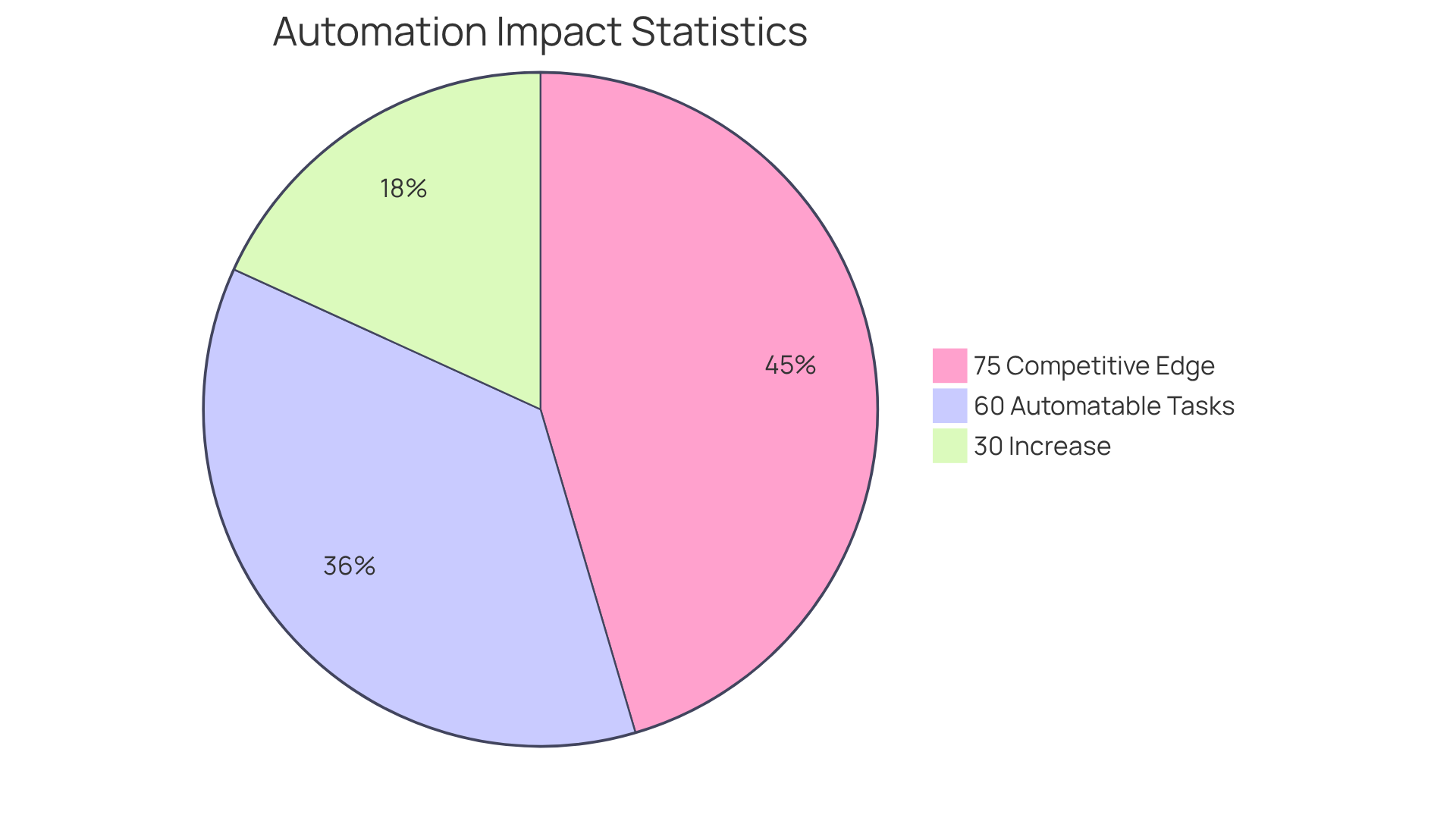
Lower Operational Costs with Automated Title Solutions
Automated solutions for documentation, such as Parse AI, play a crucial role in . By leveraging , including the example manager and robust research systems, these technologies diminish reliance on extensive manual effort and .
For instance, a company processing 1,000 orders monthly can achieve an average time savings of 30% compared to traditional methods, as highlighted in a report by TrueFocus Automation, which underscores the effectiveness of Parse AI's features. This enhanced efficiency not only enables companies to offer but also secures healthy profit margins.
As agencies face increasing demand and rising costs, the become increasingly evident. To begin implementing , firms involved with title management should assess their current workflows and identify areas where these systems can yield the most significant impact.
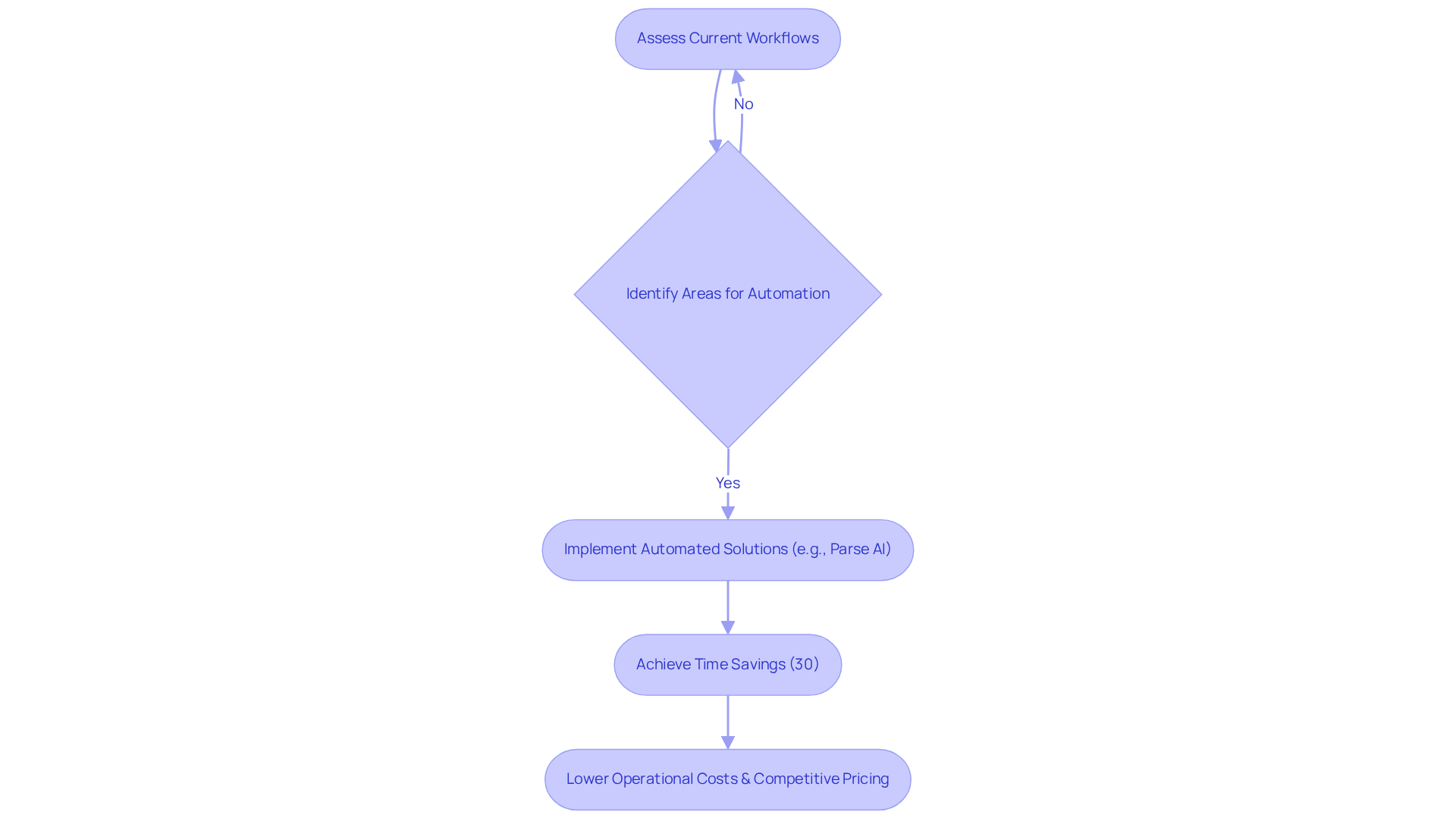
Ensure Compliance with Legal Standards in Title Research
Automated naming systems are crucial for ensuring , embedding regulatory checks throughout the research process. Parse AI is meticulously engineered to align with industry regulations, automatically identifying and flagging discrepancies that could lead to legal violations. This proactive strategy not only but also bolsters their credibility with clients.
For instance, organizations leveraging can generate audit-ready reports with minimal effort, significantly alleviating the manual burden associated with compliance tasks. Furthermore, the incorporation of enhances the precision of legal paperwork, ensuring that all essential disclosures are preserved, thereby mitigating legal risks.
As the real estate landscape evolves, the necessity for is paramount, with 91% of companies planning to implement continuous compliance measures in the near future. By utilizing , research experts can navigate the complexities of , ultimately fostering a culture of accountability and trust within the industry.
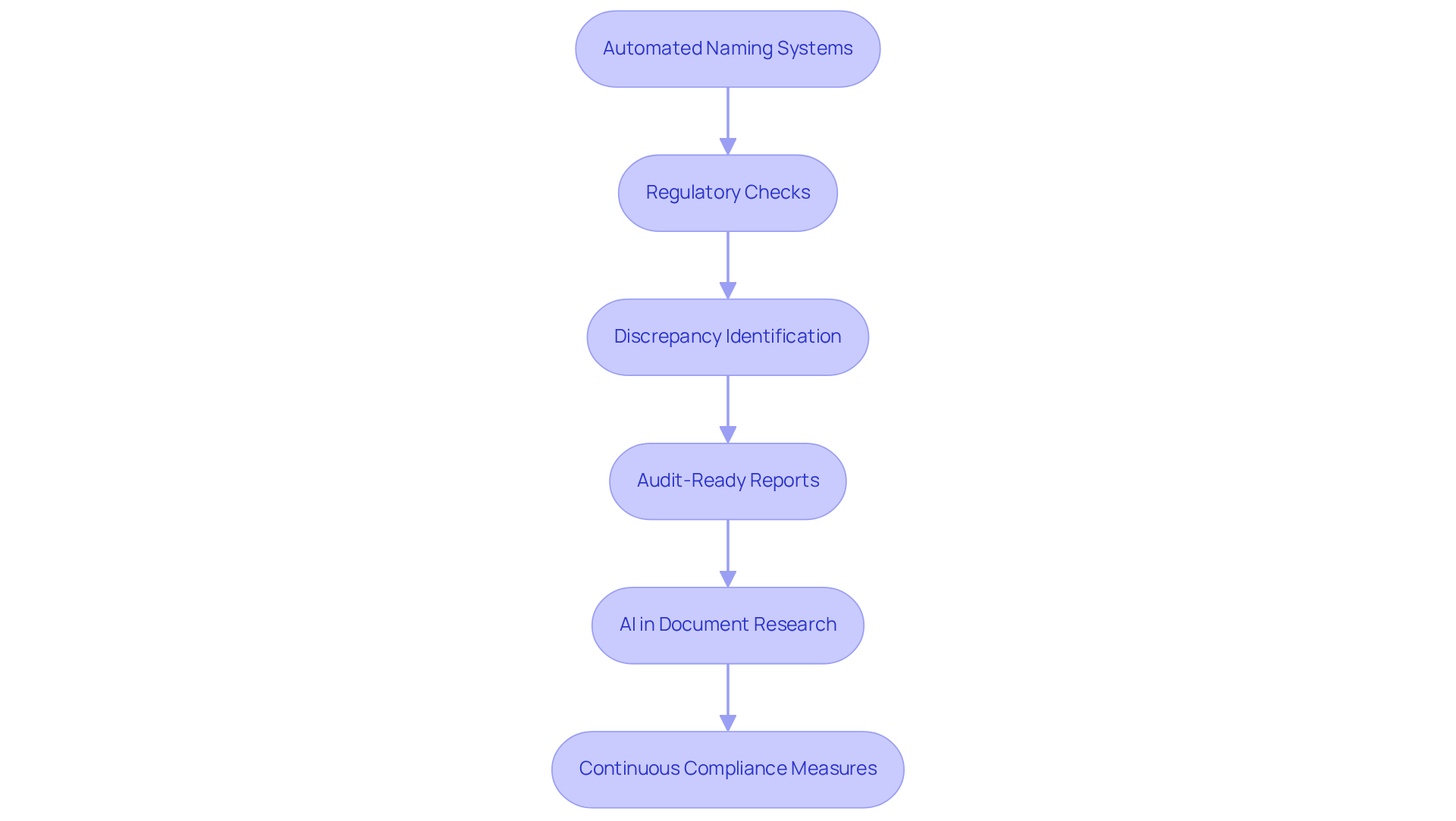
Simplify Interpretation of Complex Legal Documents
Parse AI harnesses the power of to convert intricate . This innovative approach enables researchers to quickly identify and grasp , significantly of decision-making. By , NLP reduces the risk of misinterpretation, with increased confidence.
Furthermore, as highlighted by legal experts, leverage NLP to automate the extraction and processing of information from unstructured text, . This capability not only simplifies the review process but also allows title researchers to concentrate on strategic tasks, ultimately leading to .
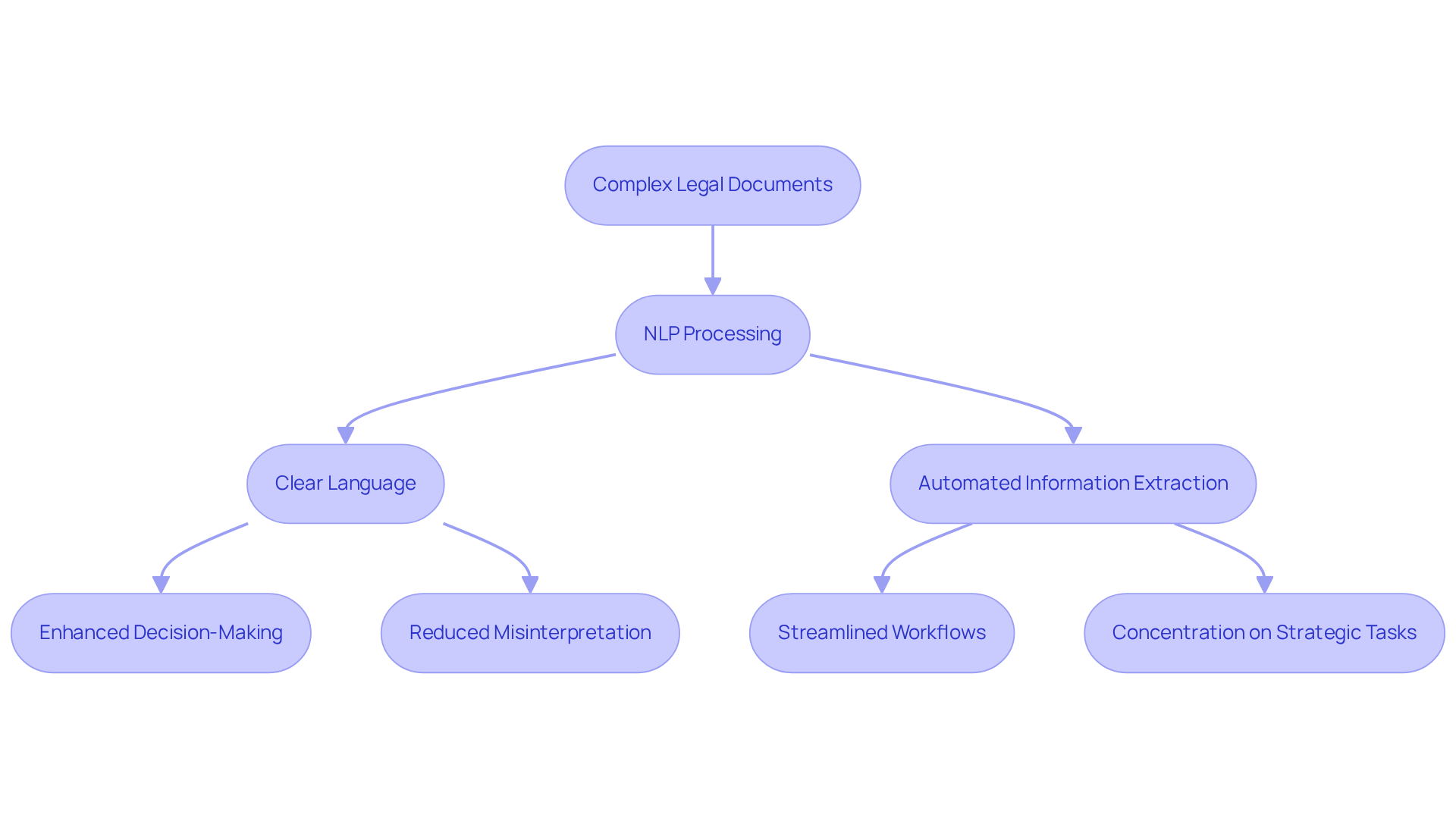
Integrate Automated Systems Seamlessly into Existing Workflows
Incorporating into current workflows aims to create a seamless process, minimizing disruption during the transition. Title companies can adopt without necessitating a complete operational overhaul, which facilitates integration that enables teams to swiftly adapt to new technologies while preserving efficiency. include:
- Conducting thorough training sessions for staff
- Ensuring clear communication about the changes
- Gradually introducing the technology to allow for adjustment
Despite the advantages, challenges such as resistance to change and . An important statistic reveals that , underscoring the necessity for a well-planned implementation strategy. As noted by industry experts, addressing these challenges is crucial for successful adoption. Numerous certification firms have effectively incorporated automation without significant disruption. For instance, companies that have implemented automated document search solutions report improved productivity and reduced operational expenses, with some achieving error reduction rates of 40-75% compared to manual methods, as evidenced by recent research.
As highlighted by industry leaders, is essential for overcoming the challenges associated with adopting new technologies in research. This approach not only addresses initial hesitations but also positions companies to leverage automation for long-term success.
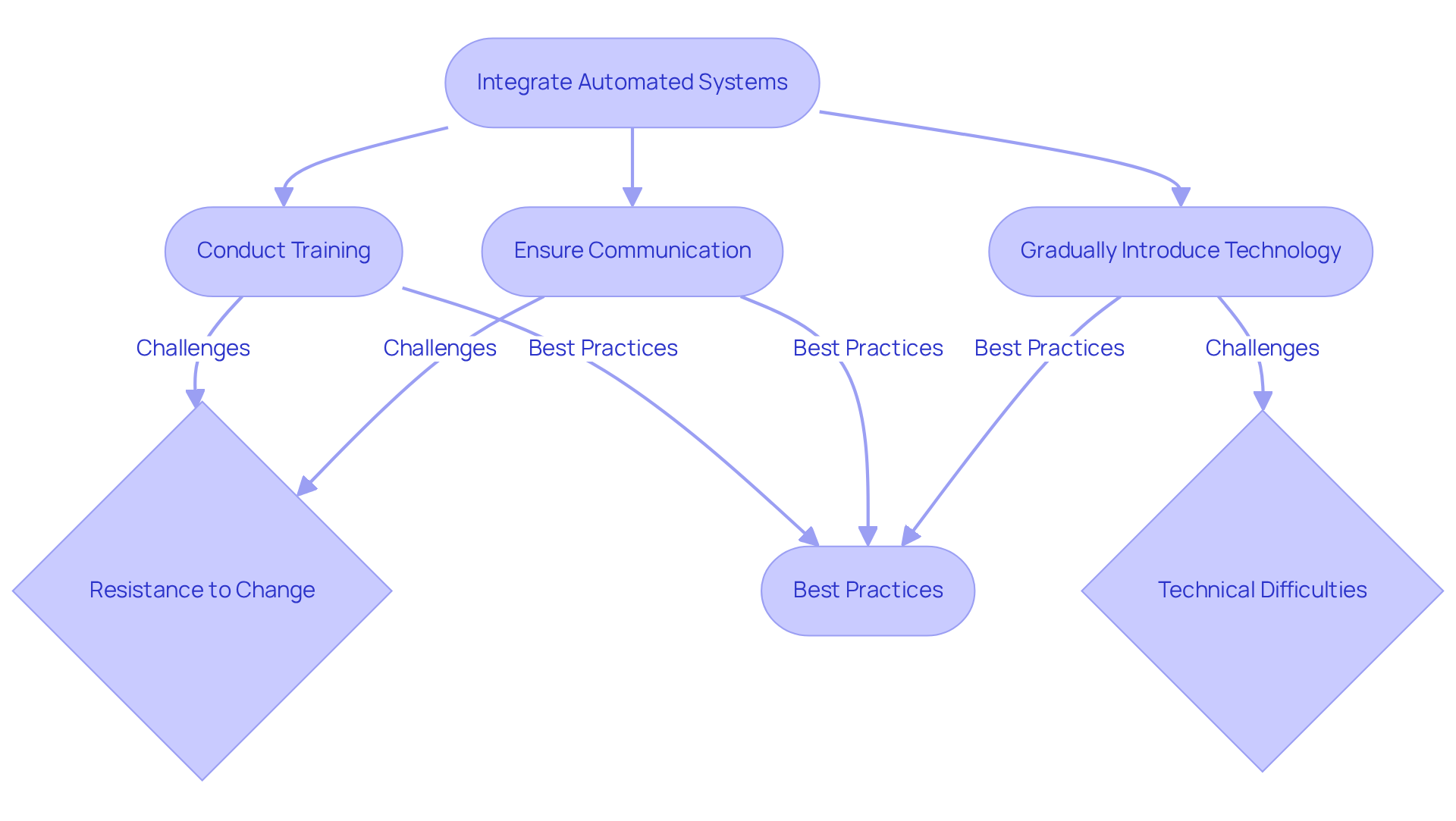
Scale Title Research Efforts to Match Transaction Volume
Automated naming systems empower companies to scale their research efforts effectively in response to fluctuating transaction volumes. With , title researchers can concurrently process a significantly higher number of files, ensuring prompt fulfillment of client demands. This during peak transaction periods, where is essential.
Organizations leveraging technology have reported ranging from 40% to 75% compared to manual processing, allowing them to manage increased workloads without sacrificing quality. Furthermore, over 80% of organizations intend to , underscoring the industry's .
As transaction volumes rise, not only enhance efficiency but also enable firms to deliver timely outcomes, thereby strengthening their competitive advantage in the real estate market. Title researchers should consider integrating automated unitization title systems to effectively manage peak transaction volumes.
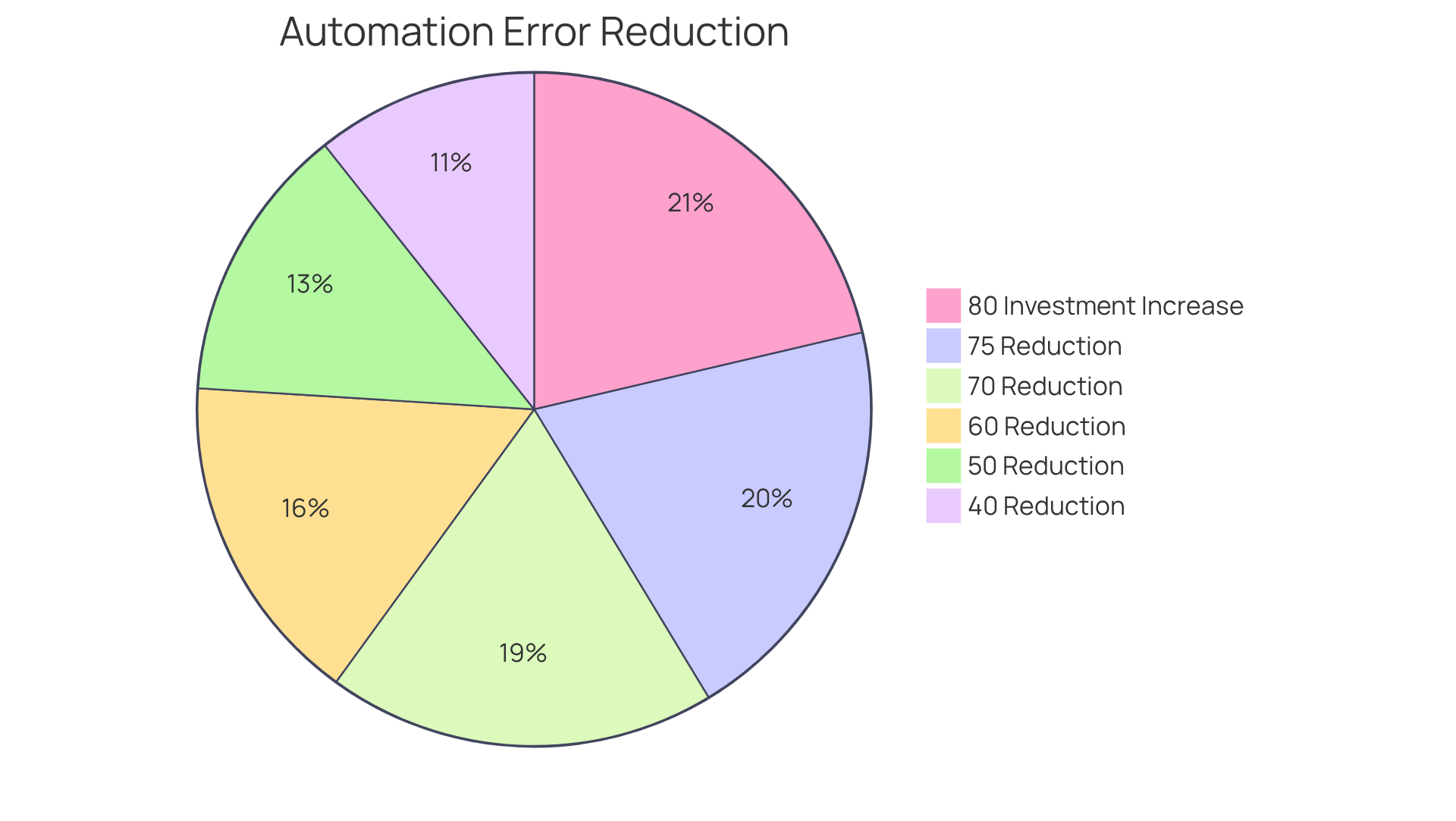
Improve Data Security in Title Research Processes
Automated naming systems significantly enhance through the implementation of advanced encryption protocols and secure information storage solutions. By employing , that sensitive information remains . This effectively reduces the risk of breaches, a crucial aspect for . Protecting client details not only fosters trust in their offerings but also aligns with the industry's growing emphasis on security. Furthermore, as the landscape of real estate automation progresses, prioritizing information security becomes essential. This ensures adherence to and enhances overall operational integrity.
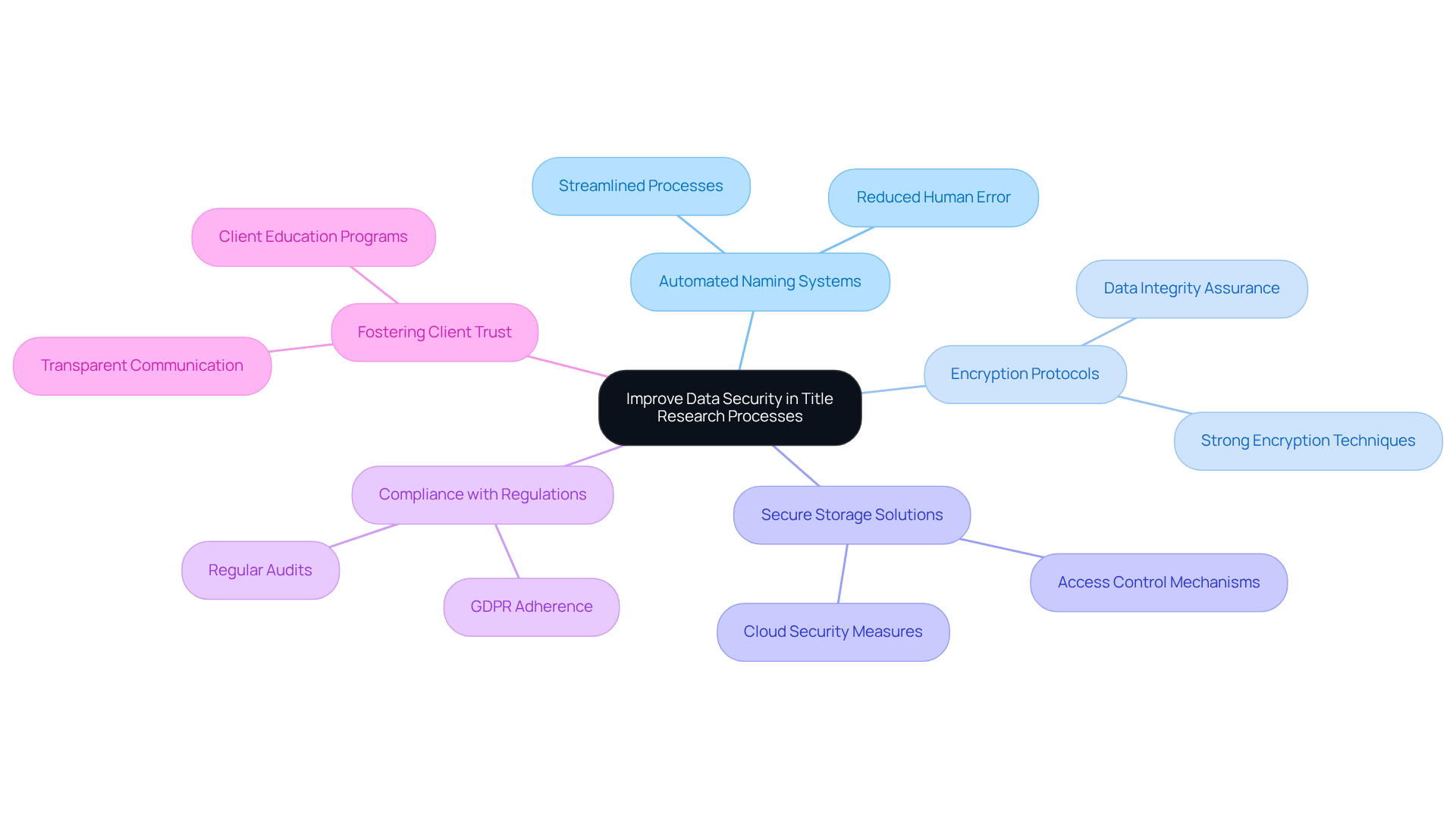
Facilitate Collaboration Among Title Research Teams
Automated naming platforms, such as Parse AI, significantly enhance collaboration among research teams by offering a centralized space for data sharing and communication. This capability enables team members to access and update information in , ensuring alignment and mitigating the risk of errors. Such not only but also foster a culture of teamwork, which is crucial for achieving superior outcomes for clients.
Research from McKinsey indicates that can lead to a , underscoring the importance of these resources in nurturing positive client relationships. Furthermore, organizations that prioritize collaboration experience a , as noted by Deloitte, highlighting the long-term advantages of investing in for title research.
Additionally, collaborative teams are 33% more likely to complete projects on time, according to research by PMI, further emphasizing the efficiency gains derived from automated unitization title systems. As Gallup states, companies that promote teamwork enjoy a 50% lower employee turnover rate, reinforcing the value of collaboration in the workplace.
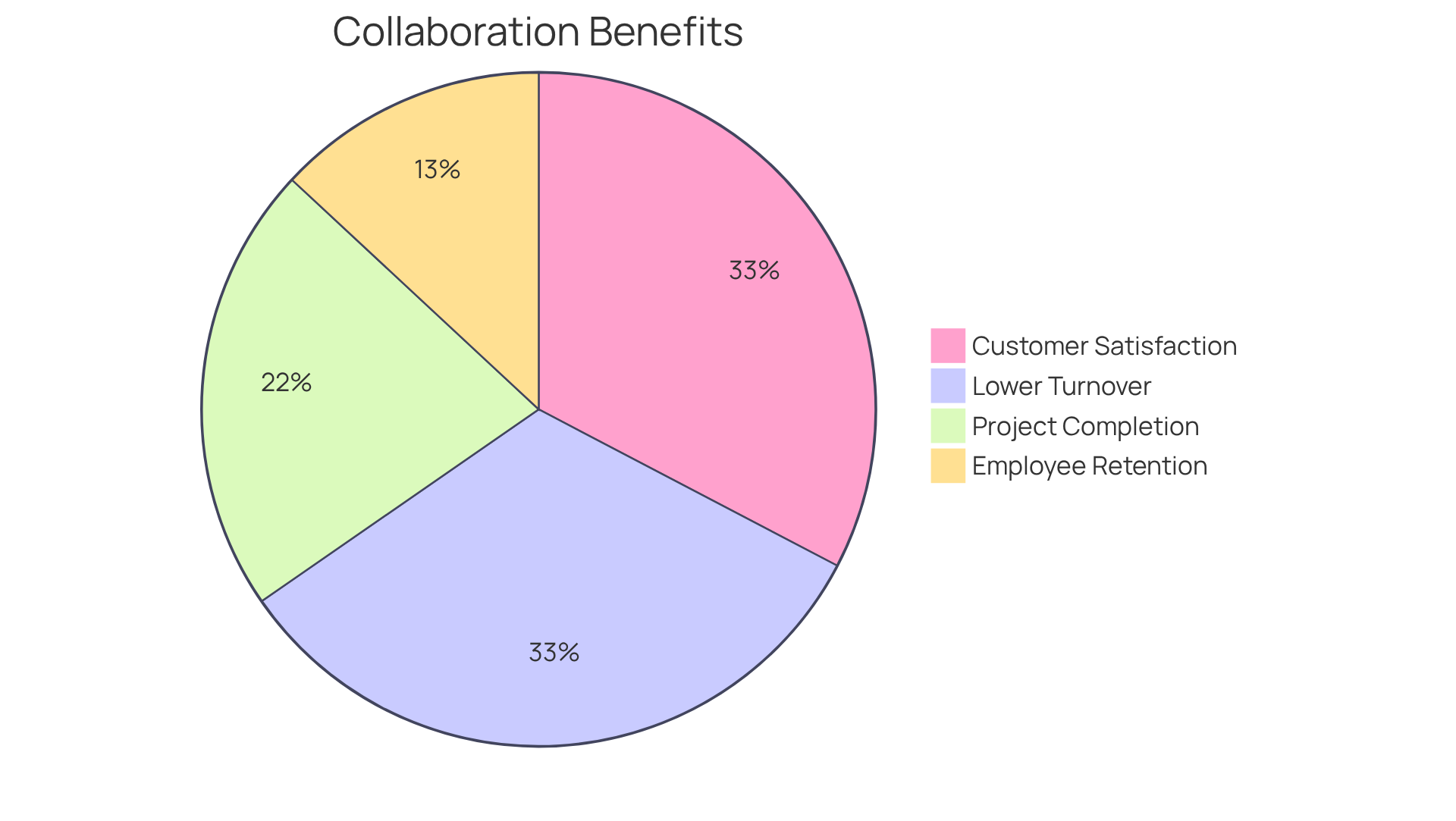
Conclusion
The transformative potential of automated unitization title systems in real estate is evident across various dimensions, from enhancing efficiency to improving accuracy. By integrating advanced technologies such as machine learning and optical character recognition, these systems streamline title research processes, allowing professionals to focus on higher-level tasks while significantly reducing manual errors and operational costs.
Key benefits highlighted throughout the discussion include:
- Improved accuracy in property ownership verification
- Substantial time savings in research and documentation
- Enhanced compliance with legal standards
Furthermore, automation fosters collaboration among research teams, enabling real-time data sharing and communication, which ultimately leads to better client satisfaction and increased productivity.
As the real estate landscape continues to evolve, embracing automated unitization title systems is not just a competitive advantage; it is becoming a necessity for firms aiming to thrive in a fast-paced market. The call to action is clear: organizations should explore the integration of these automated solutions to maximize efficiency, ensure compliance, and foster a culture of innovation that will drive success in the future.
Frequently Asked Questions
What is Parse AI and how does it improve title research processes?
Parse AI utilizes advanced machine learning algorithms and optical character recognition (OCR) to automate the extraction of essential data from automated unitization title systems. This automation reduces manual effort in research, allowing professionals to focus on more complex tasks, thereby enhancing productivity and accuracy.
What are the benefits of using automated ownership verification tools?
Automated ownership verification tools enhance the precision of property ownership confirmation by minimizing human errors associated with manual input. They cross-check diverse information sources to identify discrepancies, which helps mitigate potential legal issues and ensures compliance with property laws.
How much can manual entry mistakes be reduced by using automated unitization title systems?
Automated unitization title systems can decrease manual entry mistakes by up to 40%, leading to more precise title searches and improved operational efficiency.
What impact does automation have on the time spent on title research and documentation?
Automation significantly reduces the time required for research and documentation, allowing title researchers to complete tasks much faster than traditional methods. This efficiency accelerates the closing process and enables professionals to manage a higher volume of transactions without compromising quality.
What are the reported increases in transaction volume for organizations that embrace mechanization?
Organizations that have adopted mechanization report transaction volume increases of up to 30%, demonstrating the benefits of streamlined operations.
What percentage of firms believe that workflow technology provides a competitive edge?
Approximately 75% of firms indicate that utilizing workflow technology gives them a significant competitive edge in the real estate sector.
What are the potential risks associated with AI in the context of title research?
While AI enhances efficiency, there are privacy and governance risks associated with its use. About 81% of US executives express concerns regarding these risks.
How does the adoption of AI relate to labor productivity growth in various sectors?
According to McKinsey, sectors more exposed to AI are experiencing 4.8 times greater labor productivity growth compared to average growth rates, highlighting the trend of AI adoption in the industry.




